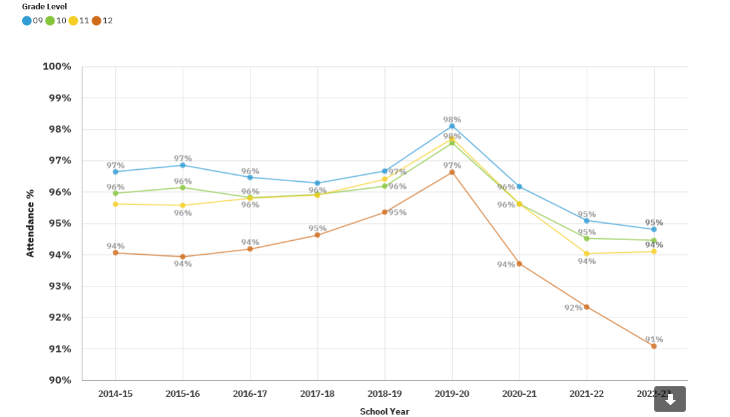Over the past few years, Wakeland’s overall attendance rate has declined. To address this issue, our administrators are working together to monitor absences more closely. This included hiring a new attendance manager, Anita Robinson, who will be with the school until December 2023.
Robinson came to the school willing to help with whatever needed attention, and for Wakeland, that was attendance.
“The attendance rate isn’t awful, it’s just not at the top. Really we just need to raise it like two to three percent,” Robinson said.
There are two main types of absences being monitored: unexcused and excused absences.
When a student has three unexcused absences it automatically triggers a truancy notification. Another truancy notification is sent at seven unexcused absences. If a student reaches ten unexcused absences, the district’s Truancy Department may take over.
“One of our goals is to remind students to turn in parent and doctor’s notes so absences are marked as excused,” Robinson said.
Students are allowed eight parent notes per year, according to the handbook. You still need a parent note whether you miss just one class or the full day.
According to state guidelines, students are required to be in school 90% of the school year. The state and district have several exemptions to this rule, including school-sponsored events, college visits, doctor appointments, and more. For the full list of exemptions, see tea.texas.gov or FISD’s Secondary Student Handbook.
When students miss more than 10% due to non-exempt days, including non-exempt excused absences and all unexcused absences, they are required to make up hours. If you miss too many classes during a semester, you will have to make up hours to get credit for the class. Students may have to make up time during power lunch, Thursday night school, or possibly on Saturdays if needed.
Since COVID, every grade level’s attendance has dropped, and seniors have taken a drastic hit. Seniors often struggle with feeling motivated to go to school, especially during the spring semester, when many seniors have already committed to a college.
“I think it’s unfortunate that we have such poor attendance. If there’s anything that can get kids more engaged in the classroom so that they have a better high school experience, I feel like that would be really beneficial for us as a school,” senior Kelsey Rayer said.
But senioritis is not the only thing contributing to low attendance. Students involved with sports outside of school can end up missing a lot of days for games or tournaments.
Kara Lee is a junior who plays golf outside of school, and like many students at Wakeland, she misses school sometimes for tournaments. Last year, she was able to make up the work she missed by going to tutorials and finishing assignments at home. Although student-athletes find ways to make up work, an attendance policy focused on discouraging absences could present a problem for them.
“I think for some students [a new attendance policy] makes sense because a lot of students don’t take advantage of the hour-long power lunch or don’t come early in the morning. But for me, I feel like it would be kind of useless because I go to tutorials, and I’m diligent about doing my work at home, so it really depends on the person,” Lee said.
Attending school can prevent the legal consequences of being absent, but Robinson believes it is also important for students to receive the best education.
“The whole point of getting the attendance up is because [students] can do work on Canvas pretty easily, but you’re not learning it at the level and depth that the kids sitting in the classroom are,“ Robinson said, “And when you’re gone and you miss that work and you come back, then you’re stressed because you have all of that work you have to catch up on. It’s like a vicious cycle of trying to get your work caught up and trying to do your current work. It’s not healthy.”
If you have a situation where you will need to be absent multiple days and you are concerned about the number of absences, you can contact an administrator.




